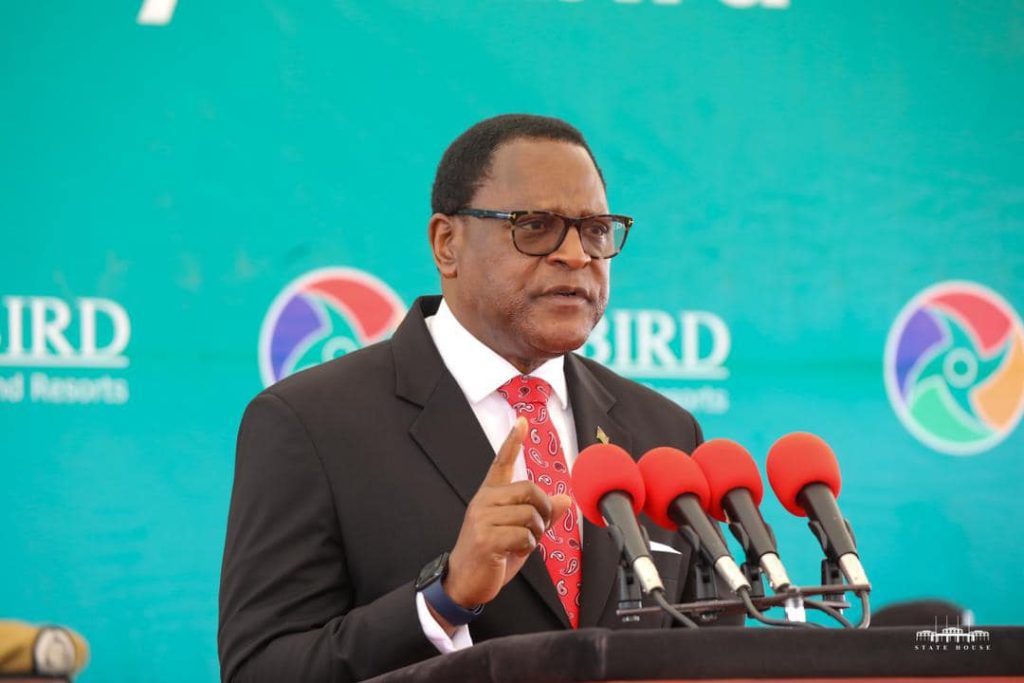The Ministry of Lands has re-drafted regulations for the newly amended land laws, removing the maximum land size one can hold. Our Assistant Bureau Chief SUZGO CHITETE takes the U-turn to experts.
For many Malawians, land is their only inheritance—their main source of livelihood.
However, many fear that the country’s lax laws put the poor majority at risk of losing their land to big barons, including foreigners who acquire vast stretches.
The shrinking land holding size for locals pushed policymakers to cap the amount of land one can hold.
Termed land laws rushed: Chakwera
The proposed regulations for the implementation of the Land Act of 2022 required no person to hold more than 1000 hectares for agriculture.
The Ministry of Lands wants the maximum land size per person scraped.
Last week, Secretary for Lands David Chilonga said the government has removed the “controversial provision” in line with Malawians’ aspirations.
The “cleaned” regulations are expected to be submitted to Ministry of Justice in September for review and gazetting.
Land law expert Chikosa Silungwe, the former Attorney General, argued that the setting of the ceiling under the subsidiary legislation was an anomaly as “it was not provided for in the principal Act”.
Dr Betchani Tchereni, an economist from the Malawi University of Business and Applied Sciences, warned that capping would put off current and future investors.
Concurring, Dr Christone Nyondo, a researcher at Mwapata Institute, an agriculture think-tank, hails the U-turn, saying the cap was a blow to national growth and foreign direct investment.
Land capping was conceived to avoid leaving the vital resource in few hands while guarantee its productive use.
Oxfam in Malawi, which advocates for land law rights, feels capping neither threaten investment nor favour the country’s poor majority.
Its country director Lingalireni Mihowa states: “The land size for investment purposes should ideally be determined on case-by-case basis between the Malawi Investment and Trade Centre and potential investors dependent on their investment needs.
“If this is the case, then it doesn’t concern a poor land holder.”
Mihowa says the resource-constrained landowners can benefit by consolidating their land and lease it to an investor for an agreed number of years.
“What would matter really are models deployed by investors. International instruments on land-based investments encourage inclusive and responsible investment models,” she states.
However, Centre for Policy Advocacy (Cepa) executive director Herbert Mwalukomo says the removal of the proposed cap from the regulations does not affect the new land law.
He explains: “With or without capping, the Executive retains the power to determine how much land can be allocated to an investor.
“I like the way the law is crafted. It does not suggest a blanket application of one ceiling across the country. The size for each new application for land has to be considered based on whether such land is available, the purpose for the application and the capacity of the applicant to develop the land.”
Landnet national coordinator Emmanuel Mlaka says the Land Act still puts a duty on the government to ensure that land is not concentrated in a few hands “to the disadvantage of other deserving persons.”
For him, what has been deleted from the proposed regulations is the method to make the law work, not government’s duty to safeguard Malawians from landlessness.
“As civil society, our interest is to ensure that the government still carries out its legislative duty to ensure every person has the right to access land for shelter and livelihood,” says Mlaka.
He urged watchdogs and campaigners to remain vigilant in ensuring that large land investment complies with national laws and international human rights instruments.
The protest against land capping was backed by the National Planning Commission (NPC), MITC and Ministry of Tourism, our sources say.
NPC is the custodian of Malawi 2063, the national long-term vision to create an inclusively wealth and self-sustaining nation by the centenary of Malawi’s independence.
The pillars of the national dream include enhancing agriculture productivity and commercialisation, industrialisation, mining and urbanisation which would be affected by limits on land holding size.
The limits on land acquisition irked estate owners, especially sugar, tea, macadamia and coffee producers.
In April this year, a member of the association of macademia planters said land capping would create uncertainty on their investment which thrive on vast farms.
Parliament first reviewed land-related laws in 2016, some 23 years after the restoration of multiparty politics in 1993. The discussion started in 1996 when then president Bakili Muluzi instituted an expert team.
Professor Boniface Dulani, a political scientist from the University of Malawi (Unima), says it is not surprising land issues remain emotive and often take centre-stage “as we get closer to election times” since the country depends on agriculture.
He explains: “That said, it does not mean governments should avoid addressing such contentious issues as we get close to elections.
“This could be the best time as Malawians will ultimately have their own say to decide on the policy prescriptions on election day by voting to retain the current government if they agree with the proposed law amendments or vote them out if they disagree.”
Parliament enacted 10 land laws in 2016, almost 14 years after activating the land policy.
However, the laws faced resistance even from President Lazarus Chakwera’s Malawi Congress Party (MCP).
The party, now part of the governing Tonse Alliance, walked out of Parliament in protest to some provisions that passed without their support.
After winning the court-sanctioned fresh vote of June 2020, Chakwera ordered a review of the “rushed” enactments.
Last year, parliament amended six land-related laws, including the Land Act.
This quick law reforms aided by regime change worry Dulani.
“Politicising laws and policies increases the likelihood that the end result might favour certain political groups instead of serving wider society,” he warns. “The lack of stability would ultimately make the land arena a politically contested field that fails to serve the wider public interest.”
The post Land capping under review appeared first on The Nation Online.
 Moni Malawi
Moni Malawi 

